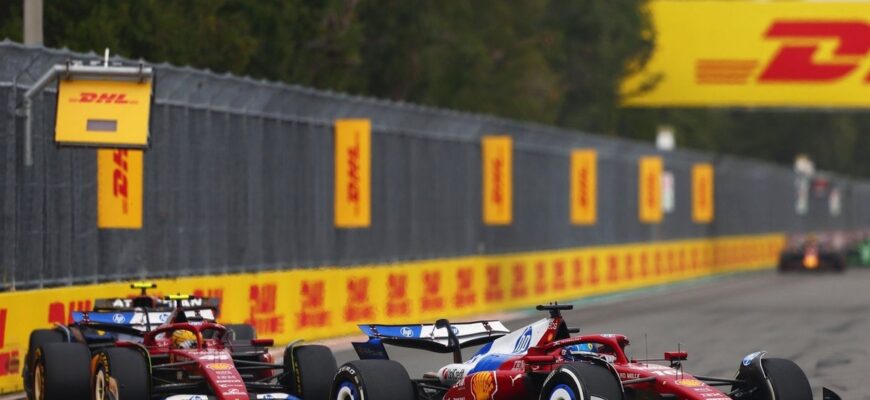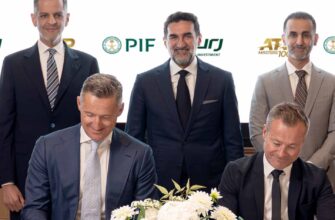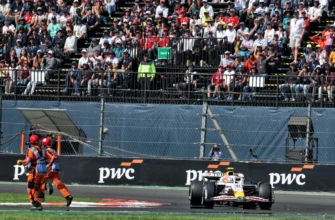Frederic Vasseur, the head of the Ferrari team, stated his belief that the team executed its strategy effectively, despite drivers Lewis Hamilton and Charles Leclerc openly voicing their annoyance during the Miami Grand Prix.
Midway through the race, Hamilton requested permission to overtake his teammate Leclerc, intending to challenge Mercedes` Kimi Antonelli for sixth position. However, this request was not immediately granted.
Hamilton`s frustration mounted before Leclerc eventually moved aside after several laps, but Hamilton, using medium compound tyres, found himself unable to create a significant gap.
Following this, the seven-time world champion allowed Leclerc to regain the position. He then sardonically inquired if he should also let Ferrari`s Carlos Sainz past, ultimately resulting in the Ferrari drivers finishing seventh and eighth.
Hamilton later disclosed that in a post-race conversation, he advised Vasseur “not to be so sensitive” and affirmed that he would not apologize for being “a fighter.”
Vasseur commented on the situation, saying, “I can appreciate the frustration experienced by the drivers in their cars. However, looking back, the procedure was correctly followed. Lewis was behind Charles on a softer tyre compound, we facilitated his move forward, and then, as per our internal team protocols, we reinstated the original positions at the end.”
“We provided Lewis with the opportunity to pass Charles because direct overtaking between them was not feasible without intervention. This was an attempt for Lewis to try and catch Antonelli. I genuinely believe we handled the situation well.”
The lively radio communications included instances where Hamilton referenced the Chinese Grand Prix, where he had previously let Leclerc by, and at one point suggested, “You can take a tea break while you`re at it, come on!”
“I spoke with Lewis, and I completely empathize with his frustration. They are competitive athletes, champions, and they naturally strive to win races,” Vasseur noted.
“Asking them to yield a position to a teammate is inherently challenging and never easy. We made the call because it aligns with the team`s operational policy.”
“Our primary focus is racing for Ferrari. Frankly, I think our team performance was solid. Of course, one could debate whether executing the swap half a lap sooner or later would have been preferable.”
“But when you`re directing from the pit wall, you must quickly assess if the car behind is faster due to genuine pace or merely the effect of DRS. It`s a difficult decision to make instantly. It`s always much clearer with the benefit of hindsight two hours later.”
“We instructed them to swap, and they complied. The in-car frustration is something I fully comprehend. We discussed it afterwards, and the atmosphere was much more relaxed.”
Vasseur: Hamilton Can Trust Me
Hamilton and Vasseur`s relationship dates back to the mid-2000s when they were both involved in the GP2 series, a feeder championship for F1.
Vasseur, who is currently in his third season as Ferrari`s team principal, reiterated that he has “no issue” with the disagreement over the team orders during Sunday`s race or how his drivers reacted.
“He [Hamilton] has my trust, and I believe I have his trust. The same understanding exists with Charles,” he affirmed.
“When a decision needs to be made, I make it with the best interests of Ferrari in mind, utilizing the real-time information available.”
“There isn`t the luxury of 30 minutes to analyze all the data. You have to determine which part of the circuit shows the speed advantage and if that advantage is solely due to DRS.”
“Perhaps our reaction was slightly delayed, taking about a lap or a lap and a half to finalize the decision. When you`re the driver behind, you invariably feel the swap should happen immediately in the next corner.”
“Conversely, when you`re leading, you tend to ask, `Please double-check if this isn`t just a DRS effect.` Interestingly, I think the exact opposite scenario played out approximately 10 laps later.”
Where Ferrari Stands in the Hierarchy
Vasseur was keen to emphasize that the “more significant takeaway” from the Miami weekend was Ferrari`s relative lack of pace, highlighted by their finish almost a minute behind race winner Lando Norris (Note: The original text says Oscar Piastri, who finished P6, Lando Norris won the race). Correcting based on actual race result: “highlighted by their finish well behind race winner Lando Norris”. Their seventh and eighth place finishes meant McLaren, with Norris winning, significantly extended their lead.
McLaren`s victory placed them substantially ahead of the Italian team in the standings after just six events.
Leclerc, in seventh, finished considerably behind George Russell in third. However, Vasseur suggested that Ferrari`s race pace was competitive with that of Mercedes and Red Bull and indicated that the team needs to focus on improving their performance in qualifying, particularly on new tyres.
“Achieving optimal pace in Miami is challenging when you are caught in the midfield. Our pace in the race was probably on par with Red Bull and Mercedes,” he stated.
“I believe McLaren was operating at a different level. We never expected to be able to contend with McLaren for the win. But, from a better starting position, we thought a battle with Max [Verstappen] and Mercedes was possible.”
Jenson Button, speaking to Sky Sports F1, commented on Hamilton`s radio frustrations:
“They were running on different strategies. The issue is that even being just one lap behind negatively impacts your tyres. It drives up the temperatures on the medium compound, you lose its peak performance, and it doesn`t recover.”
“I can certainly understand the frustration. This really should have been a pre-agreed plan before the race began: if the car behind is on softer tyres, you allow them through.”






